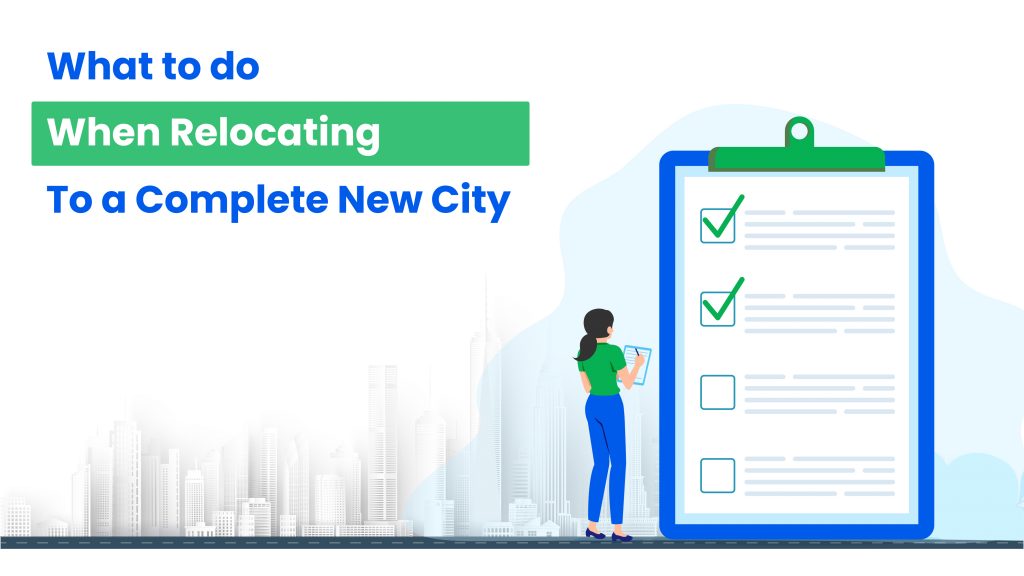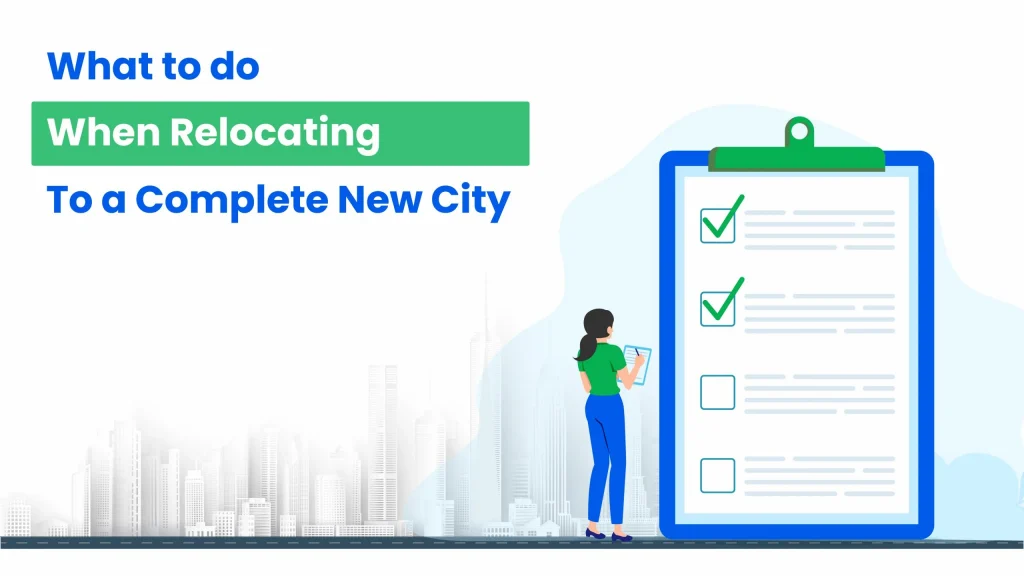Moving to a new city requires a significant amount of planning and preparation. Despite appearances, it’s not as difficult as it might seem. The “new city” probably has an entirely new language, climate, cuisine, and culture. It may take some time.
It takes courage to uproot one’s life, abandon one’s social network, and venture into the unknown. Worry not; however, we will explain how moving to a new city is worthwhile and a breeze. Thanks to technological development, relocating to a new city is now a lot less of a burden.
Here are some suggestions to help you organize your relocation so that everything goes off without a hitch.

How to Get Prepared to Move to a New City?
Moving to a new city is a significant life change because you will have to begin. You should think about a few things before you go in.
1. Research and choose a city
Changing residences is usually a necessary measure for most of us. Whether it’s for a new job, a new partner, or a new course of study, change is often precipitated by circumstances beyond our control. In that situation, the location is often chosen for you.
If you fall into the second category, people who are relocating because they want to, you must choose a new city to call home. Moving to a new city can give you a new perspective on life.
Always plan before moving to a different place. To accomplish this, you’ll need to visit the area, read regional media, and conduct light web research. Before making the big move, learning as much as possible about the city you’ll be relocating to is essential. You can even consult to get recommendations on desirable local areas, when deciding on how to move to a new city.
2. Choose a neighborhood
Choosing the neighborhood you wish to live in is the first task after deciding where to move. Finding an apartment will be considerably more straightforward; otherwise, you’ll have to sift through hundreds of possibilities across the city.
Choosing a city is like deciding what’s most important to you. As you decide on a new area, keep in mind several things:
- The time it takes to get to work
- The average cost of living
- Safety
- Walkable neighborhoods
- Access to many forms of public transportation
- Convenient parking
Location near parks and other areas - Convenience to amusements and recreational opportunities
- Housing options and types (houses vs apartments)
So, how can you learn about all this without actually going to the area? And here’s the method we find most useful:
1. Look up “best neighborhoods in [name of city]” on Google to get an idea of the various areas in that city.
2. Examine the area on Google Maps. You can see the neighborhood from above with a satellite view or from the ground with a street view to get a feel for things like parks and local establishments.
Remember that there isn’t any such thing as an “ideal” community while selecting. You’ll likely have to give in on multiple fronts. There will be equivalent costs and benefits in your local area search. Just focus on keeping your expectations reasonable and focusing on what matters. If your objectives have shifted, you can permanently relocate to a new area.
3. Make a relocation budget
Expenses in each area may remain mostly the same, but understanding your budget will go a long way toward helping you settle in securely in your new place. Therefore, research accommodation, transport, healthcare, food costs, etc., to determine how much you will likely spend. The cost of moving can quickly build up.
Here are some things to keep in mind while making a relocation budget:
The expense of selling or vacating your home, including the damage deposit, cleaning fees, and any sales commission.
The price of shipping and moving, mainly if you’re leaving the area.
Talk to people you know there to get a sense of the cost of living, how much money you’ll need for necessities, and other information that might guide your financial preparations. However, it is essential to prepare your budget, as the accommodations you pick should be within your financial means.
4. Likelihood Of Living
You should evaluate how your new payment will affect your regular expenses and whether or not you will be able to put any money away if you are offered a job. Despite higher pay, relocating may force you to spend less due to higher living costs. Determine how long your earnings will last if you relocate to a new city without a job and rely only on your savings before you start looking for work.
5. Establish Social and Professional networks
Having supportive friends, relatives, and acquaintances already established in your new community might help smooth the transition to your new home. If you can’t discover any in your immediate area, you may ask your current and former acquaintances and colleagues for introductions. Additionally, you can contact former co-workers and classmates.
6. Locate a Home
Settling in a new city might be challenging if you need to become more familiar with the area. Always look for a residence, even if your new employer provides temporary housing. Take the initiative to reach out to your local contacts, conduct online research, and secure a place to live in your desired city area. This will save you from spending the first few days in a daze while you wander the city searching for your ideal home.
It may take some time to get used to renting an apartment if it is your first time.
The standard requirements for an apartment application are as follows:
Verification of your financial stability
The landlord will utilize the tenant’s driver’s license information and social security number to run a credit and professional background check.
Previous Landlord References.
In a little more than a few days, you will be notified of the status of your application. The following steps are dependent upon whether or not your application is accepted.
7. Prepare for relocation
Once the moving date has been determined, the actual relocation can be planned. If you are relocating a substantial quantity of belongings across a substantial distance, you will need to consider all your possibilities.
Comparing the costs of several moving options can guarantee that you choose the most cost-effective solution that meets your requirements and budget.
Begin packing:-
1. Initiate early
The big day may seem far away, but a moving day tends to sneak up and arrive before you realize it. Having enough time when moving is crucial, so starting sooner will give you plenty of time to pack and sort your belongings.
2. Don’t move everything
When relocating to a new city, especially if it is distant from your current location, you will want to bring only the essentials. In addition to being more economical, you will appreciate this when it is time to unload. Sorting through your possessions and discarding or donating the items you don’t want is a fantastic way to make the work easier.
3. Mark and name each package
You can employ several strategies to maintain order during the packing process. Label items and maintain as much organization as you can. The goal is to arrive at the new location with everything unpacked and appropriately positioned using master lists and color coding.
8. Employ a Skilled Moving Company
Find and hire a reliable logistics firm with a good reputation. Everything has value, whether it’s a piece of furniture, electronics, or an article of clothing. A dependable, reasonably priced moving and packing service is essential.
Conclusion
Now that you’ve got an idea of how to move to a new city, you’ll finally be prepared. You can avoid stress throughout the relocation process by using the services of HappyLocate, which provides professional movers and packers.



